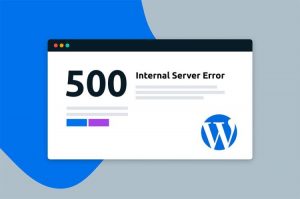The 500 Internal Server Error is a reasonably general HTTP status code that indicates something has gone wrong on the website’s server. Still, the server cannot be more precise about the nature of the problem.
How to Recognize a 500 Error
Because each website is allowed to personalize the message, the error message may appear in various ways.
How You Might See a 500 Error
Here are some of the most possible causes of the HTTP 500 error:
- Internal Server Error 500
- Internal Server Error HTTP 500
- Temporary error (500)
- Error on the Internal Server
- HTTP 500 Internal Error
- 500 Error
- HTTP Error 500
- That is an error 500.
Because of a 500 Internal Server Error issue by the website you’re visiting, you may encounter one in any browser on any operating system, including your smartphone. It usually appears inside the browser window, just like online pages on websites.
The main Cause of HTTP 500 Errors
Internal Server Error signals, as previously said generally something is wrong.
Most of the time, “wrong” showto a fault with the page’s or site’s programming, but there’s a chance the issue is on your end, which we’ll look at further below.
When an HTTP 500 error occurs on a Microsoft IIS software server, more specific information regarding the above is usually presented. Look for numbers following 500, such as HTTP Error 500.19 – Internal Server Error, which indicates that the configuration backup is null.
How to Fix 500 Internal Server Error
As previously stated, the 500 Internal Server Error is a server-side error. Therefore, the problem is likely not with your computer or internet connection but the website’s server.
While it is unlikely, something may be wrong on your end, in which case we will look at some things you can try:
Refresh the site page.
You can do so by clicking the refresh/reload button, pressing F5 or Ctrl+R, or retyping the URL in the address bar.
The problem may only be transitory even if a web server fault causes the 500 Internal Server Error. Then, attempting the website again is usually successful.
If the message occurs during the checkout process at an online retailer, be aware that several checkout attempts may result in multiple orders—and many charges! Most shops have inbuilt safeguards against such behaviors, but it’s still something to keep in mind.
Clear the cache in your browser.
If the cached version of the page you’re seeing has a problem, it could be triggering HTTP 500 errors.
Caching issues do not frequently create internal Server Errors, although we have observed the error disappear after clearing the cache on occasion. Nevertheless, it’s a simple and risk-free experiment, so don’t pass it up.
Some 500 Internal Server Error difficulties can be fixed by removing the cookies associated with the site from which you receive the error.
Restart the browser
- Restart the browser after removing the cookie(s) and try again.
- Instead, treat this as a 504 Gateway Timeout error. Although it is rare, some servers generate a 500 Internal Server Error when, in fact, a 504 Gateway Timeout is a more suitable message based on the reason for the problem.
- Another alternative is to contact the website. There’s a strong probability that the site’s administrators are already aware of the 500 error, but if they aren’t, informing them will benefit both you and them (and everyone else).
- Most sites offer social network profiles for help; a few even include email and phone lines.
- Unfortunately, on this point, the 500 Internal Server Error is almost certainly a problem outside your control that will be resolved by someone else.
- Suppose the 500 Internal Server Error message arrives during an online transaction. In that case, it may be helpful to understand that sales are most likely being disrupted—usually, a tremendous incentive for the online company to resolve the issue as soon as possible!
- Even if you are getting 500 errors on a site that doesn’t sell anything, like YouTube or Twitter, as long as you have informed them about the problem or attempted to do so, there’s little you can do but wait.
Error 500 Internal Server Errors on Your Website
A 500 Internal Server Error on your server necessitates an entirely new approach. Most 500 error are server-side failures, which means it’s most likely your problem to resolve if it’s your website.
There are numerous reasons why your site may be returning a 500 error to your viewers; however, the following are the most common:
- A Permissions Error has occurred. Improper permissions typically cause a 500 Internal Server Error on one or more files or folders. Most of the time, erroneous permission on a PHP or CGI script is to blame. These are commonly set to 0755. (-rwxr-xr-x).
- A PHP Timeout occurs. An HTTP 500 error can occur if your script connects to external resources and those resources are time out. If this is the cause for the 500 error, timeout rules or improved error handling in your writing should assist.
- A coding error in the. htaccess file. While less prevalent, make sure your site’s.htaccess file is appropriately formatted.
- If you’re using WordPress, Joomla, or another content management or CMS system, look for more specific help troubleshooting a 500 Internal Server Error in their support centers.
- If you aren’t utilizing a commercial content management system, your web hosting company, such as InMotion, Dreamhost, IONOS (1&1), and others, will most likely provide some 500 Error help to your scenario.
Additional Causes of an Internal Server Error
- When Google services, such as Gmail, find the error, they frequently report a Temporary Error (500) or simply 500.
- When Windows Update is involved, the message WU E PT HTTP STATUS SERVER ERROR or the 0x8024401F error is displayed.
If Microsoft IIS powers the website reporting the 500 error, you may receive a more specific error message:
| 500 Internal Server Error List | |
|---|---|
| Code | Explanation |
| 500.0 | Module or ISAPI error occurred. |
| 500.11 | Application is shutting down on the web server. |
| 500.12 | Application is busy restarting on the web server. |
| 500.13 | Web server is too busy. |
| 500.15 | Direct requests for Global.asax are not allowed. |
| 500.19 | Configuration data is invalid. |
| 500.21 | Module not recognized. |
| 500.22 | An ASP.NET httpModules configuration does not apply in Managed Pipeline mode. |
| 500.23 | An ASP.NET httpHandlers configuration does not apply in Managed Pipeline mode. |
| 500.24 | An ASP.NET impersonation configuration does not apply in Managed Pipeline mode. |
| 500.50 | A rewrite error occurred during RQ_BEGIN_REQUEST notification handling. A configuration or inbound rule execution error occurred. |
| 500.51 | A rewrite error occurred during GL_PRE_BEGIN_REQUEST notification handling. A global configuration or global rule execution error occurred. |
| 500.52 | A rewrite error occurred during RQ_SEND_RESPONSE notification handling. An outbound rule execution occurred. |
| 500.53 | A rewrite error occurred during RQ_RELEASE_REQUEST_STATE notification handling. An outbound rule execution error occurred. The rule is configured to be executed before the output user cache gets updated. |
| 500.100 | Internal ASP error. |
ALSO SEE:Errors in Windows




